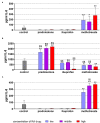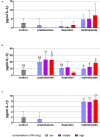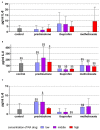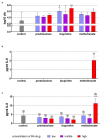In vitro activity of anti-rheumatic drugs on release of pro-inflammatory cytokines from oral cells in interaction with microorganisms
- PMID: 36118051
- PMCID: PMC9478466
- DOI: 10.3389/froh.2022.960732
In vitro activity of anti-rheumatic drugs on release of pro-inflammatory cytokines from oral cells in interaction with microorganisms
Erratum in
-
Erratum: In vitro activity of anti-rheumatic drugs on release of pro-inflammatory cytokines from oral cells in interaction with microorganisms.Front Oral Health. 2023 Mar 28;4:1178207. doi: 10.3389/froh.2023.1178207. eCollection 2023. Front Oral Health. 2023. PMID: 37057138 Free PMC article.
Abstract
Periodontitis patients suffering concomitantly from rheumatoid arthritis (RA) often present with less inflamed periodontal tissues due to the ongoing anti-rheumatic therapy. This in vitro study was aimed to analyze whether anti-inflammatory drugs used in the therapy of RA can modulate the release of IL-8 and IL-1β by professional and non-professional immune cells stimulated with microorganisms. Periodontal ligament (PDL) fibroblasts, monocytic MONO-MAC-6-cells, and gingival keratinocytes were exposed to ibuprofen, prednisolone, and methotrexate with and without lysates of Fusobacterium nucleatum or Candida albicans. Supernatants were obtained and the levels of interleukin(IL)-8 and IL-1β (only MONO-MAC-6) were quantified. The addition of F. nucleatum lysate resulted in the strongest release of proinflammatory cytokines by PDL fibroblast and MONO-MAC-6 cells, while the modification by the tested anti-rheumatic drugs was only minor. After stimulation of the MONO-MAC-cells with F. nucleatum, prednisolone increased the release of IL-8, whereas methotrexate decreased the level. Anti-inflammatory drugs increased the adherence of C. albicans to epithelial cells. In patients with RA, the reduction of the microbial load in subgingival biofilm (biofilm removal) is of major importance; however, the intake of inflammatory drugs may interfere with the inflammatory response.
Keywords: anti-inflammatory drugs; oral cells; periodontitis; proinflammatory cytokines; rheumatoid arthritis.
Copyright © 2022 Stähli, Scherler, Zappalà, Sculean and Eick.
Conflict of interest statement
The authors declare that the research was conducted in the absence of any commercial or financial relationships that could be construed as a potential conflict of interest.
Figures




References
LinkOut - more resources
Full Text Sources
Molecular Biology Databases

